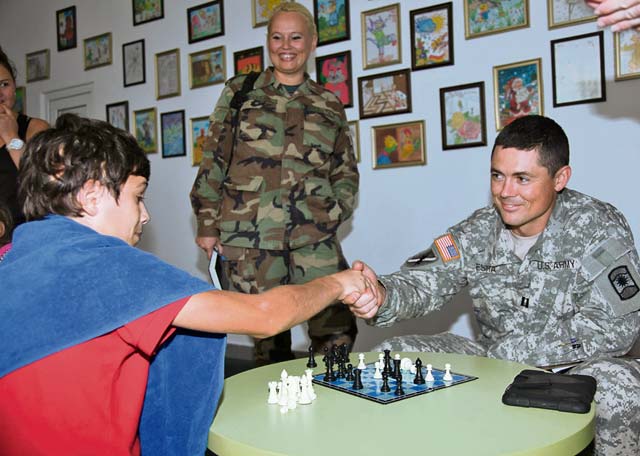
Capt. Dave Esra, commander of Headquarters and Headquarters Company, 361st CA Brigade, 7th Civil Support Command, shakes hands with Cristian Trocin, of Dcochia City, Moldova, after a chess match Sept. 11 at Moldova’s National Children Rehabilitation Center in Ceadir-Lunga, Moldova.
CHISINAU, Moldova — Soldiers from the 7th Civil Support Command, 21st Theater Sustainment Command deployed to this Eastern European nation Sept. 9 for assessments of U.S. European Command humanitarian assistance projects designed to improve the lives of the Moldovan people.
Soldiers from Company A, 457th Civil Affairs Battalion, 361st Civil Affairs Brigade, partnered with Moldovan troops to evaluate several projects including a children’s rehabilitation center, a fire and rescue station, an elementary school, a sanitation project, a burn treatment clinic and a community center.
“We are here to evaluate how the HA projects align with the Department of State and European Command’s strategic objectives in the Moldovan Country Cooperation Plan with the United States,” said Capt. Nathan Gardner, the Co. A commander. “EUCOM provides the funding for these projects. We’re here representing the EUCOM HA program.”
The HA projects are designed to build the country’s capacity along different lines of activity, thereby increasing disaster management and essential service capacity. The assessment objectives are designed to determine if the projects were effectively implemented and effectively sustained, Gardner noted.
The team provides its assessments to the U.S. Embassy in Moldova’s Office of Defense Cooperation and the EUCOM HA program managers, who use them so the projects will endure and support the MCCP in the future.
“We’re going back (generally) within three to five years (after a HA project) was completed,” said Staff Sgt. Dorian Pekarcik, whose expertise includes civil and mechanical engineering. “We go to see what the state of the project is and if it meets EUCOM requirements,”
“So far, all the projects we have seen have built capacity, impacted the Moldovan people in a positive way and been sustained by our Moldovan partners,” Gardner said.
At each site, the team spoke with key leaders, project supervisors and people who use the services, Pekarcik said. Roughly 50 percent of the Moldovan citizens interviewed knew of U.S. involvement in the projects.
“One of the shop owners knew that the U.S. had invested money to get the project going,” Pekarcik said after the fire station visit. “We’re seeing that they have an idea that the U.S. was involved, but they don’t know all the details.”
“This is great for both EUCOM and the ODC to know so that they can continue to work on ways to better ‘brand’ their projects in the future,” said Maj. Patrick Considine, the program manager for EUCOM J-4-Engineers’ Humanitarian and Civic Assistance.
For Sgt. Jacob Francis, the trip offered a chance to work as both a linguist and team sergeant. Francis speaks Romanian, which is linguistically similar to the Moldovan language. Each day before the assessments, he’d read local newspapers to better understand Moldovan views and he provided the team culture and language training beforehand.
“I’m bringing a political, cultural and language expertise to the HA assessment mission,” Francis said. “My experience living and working in Romania helped” contribute to the team.
One assessment took the joint team to the Moldovan National Rehabilitation Center in Ceadir-Lunga. Once a regional tuberculosis clinic, it’s now reconfigured to meet a nationwide need for a disabled children rehabilitation hospital.
“Today the center is providing rehabilitation services (for a majority of child patients) with neurotic issues, orthopedic issues and pulmonary issues,” said Dr. Tatiana Damascan, chief doctor at the center.
The presence of Moldovan troops on the team builds their capabilities and enhances American understanding, said Staff Sgt. David Heath and education specialist with Co. A, 457th CA Bn.
“They not only helped with the translation, they asked pertinent questions and gave us nuanced feedback from the staff at the different HA sites we visited,” he said.
“It’s important for us because we have similar activities and I think it will be a good experience for us for the future projects in our country — or also for the future missions for my battalion,” said Moldovan army 1st Lt. Simion Bitca, military intelligence officer with the Special Forces Battalion.
“Overall, the HA assessments are positive,” Heath said. “The firefighters and the staff at the rehabilitation center are extremely proud to work at them and the local community, in general knows about them (the HA projects) and the U.S. contribution.”
“The American people have a big heart,” said Col. Oleg Tibirna, fire chief, Emergency Situations Causeni Region. “They implement major projects and I’m sure the people of Moldova appreciate that.”


